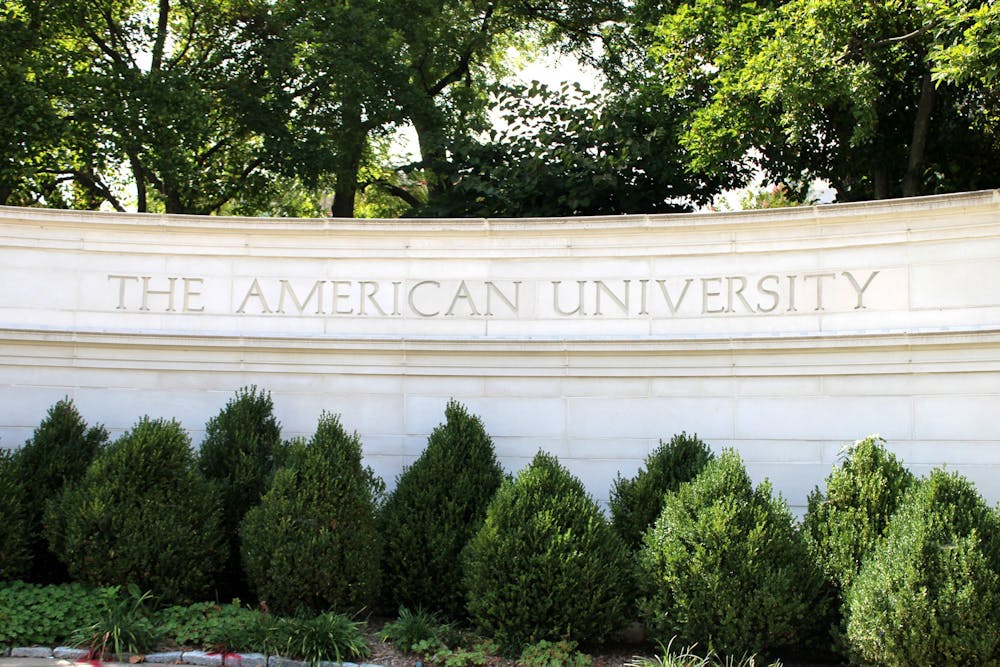American University proposed allowing some forms of indoor protests this fall as part of a forum hosted by Acting Provost and Chief Academic Officer Vicky Wilkins for University faculty and staff to discuss draft policies related to free expression on Thursday.
The proposal comes after the University banned indoor protest in a Jan. 25 speech directive. Draft policies discussed at the meeting and reviewed by The Eagle show the University is exploring content-neutral time, place and manner restrictions for indoor protests and would allow indoor protests that are not disruptive.
Vice Presidents Raymond Ou, Traevena Byrd and Matt Bennett, along with Wilkins, explained proposed changes to the Jan. 25 speech directives and answered questions from in-person attendees. Wilkins said the University plans to establish the policy by the end of the month.
Faculty and staff could attend the event either in person or virtually via Zoom. Before the forum, attendees were emailed a packet that reviewed each policy, its current provisions to be retained and the proposed changes for fall 2024, which was obtained by The Eagle. During the forum, Ou, Byrd and Bennett told attendees the policies they received were still in the drafting process.
The new proposed changes for the fall 2024 semester would remove restrictions that posters must be inclusive and related to a university organization’s event and would now apply time, place and manner restrictions.
The proposed policies would keep the policies that posters placed on university-managed bulletin boards would need to be approved, but would also provide areas for free posting boards.
The proposed changes would allow the University to restrict content on posters and flyers at university-hosted events, which they describe in the document as including student involvement fairs and admissions events. At the Involvement Fair in January, 35 organizations displayed a paper on their tables saying “This organization stands with Palestine.”
In-person participants could ask questions and voice concerns to Wilkins, Ou, Byrd and Bennett while those on Zoom asked questions in the chat. Faculty and staff could also submit questions prior to the meeting. While questions asked over the Zoom chat were not asked during the discussion, Director of Strategic Initiatives and Communications Sara Biggs informed participants the chat was being saved. One question from prior submissions was asked.
Many staff and faculty on Zoom asked for clarification on time, place and manner restrictions and additional constraints the University could enforce toward postings, yet their questions remained unanswered.
Ou addressed issues raised by defining speech as “obscene” in proposed changes related to chalking, tabling and postering, stressing that clarity on policies is helpful to students.
“I do think that we want to move to that place where the default isn’t ‘Did you violate a policy?’ and ‘What is the next step to hold you accountable?’” Ou said.
Byrd said “stakeholders” were influential in providing transparency and defining terms used in the policies like obscene. Virtual attendees inquired about the role of these stakeholders in University policy, yet their questions went unanswered.
“We have engaged a lot of stakeholders on giving us feedback and helping us understand what any concerns are about how we define disruption; what were some opportunities for clarity,” Byrd said.
Byrd reminded those in attendance that policies in the packets were just summaries of ongoing policy development.
“Those were not actual policies. We’re not hiding the ball either, because we pulled every relevant provision that we thought was really important for everyone to weigh in on, that everyone would care about,” Byrd said. “We put those in the summaries. We’ve been working on policies, but there’s lots of skeletal frameworks that are floating around.”
Byrd also told the forum that the policies provided were not finalized and administrators would use the feedback to finalize drafts by next week. There will also be an additional opportunity for faculty and staff to submit comments, although the University is still looking to establish policy by the end of the month, Wilkins said.
“We will make those available for all of you and others beyond this room and this Zoom to review and weigh in. There will be an opportunity to submit comments and we will continue to shape those and hopefully get them in good order by the end of the month in time for the beginning of the academic year,” Byrd said.
Wilkins told staff and faculty that there is a goal to host a conversation on free speech for the student body, saying a definition should be established for free speech on campus. Additionally, Wilkins advised that both the value and prioritization of free speech should be discussed, and continued to emphasize protecting the safety of students in the establishment of these new policies.
“I don’t know how we learn and go forward in a place of fear and when our students feel like any misstatement or statement or anything might lead to an attack,” Wilkins said. “Then I have students tell me ‘I will never break bread with someone who believes x or y,’ that’s not how this is supposed to work. This is not how we succeed or how individuals get by in communities.”
While Wilkins acknowledged it was important to protect students and prioritize student safety, students were not sent invites to the forum to provide input or feedback. Rather, the forum was only for faculty and staff.
Wilkins said the forum as a start rather than an end, and said that they are “committed to scheduling another [forum] in the coming weeks.”
Correction: A previous version of this article referred to the policies as student expression policies. The story has been updated to reflect that the policies would apply to the whole university.
This article was edited by Olivia Wood, Tyler Davis and Abigail Turner. Copy editing done by Luna Jinks.





